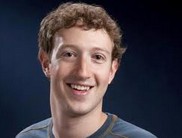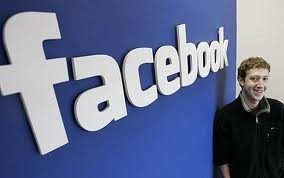对于全世界各地的很多网民来说,马克·扎克伯格这个名字并不陌生。他是《时代》周刊评出的“2010年年度人物”,被《名利场》杂志称作“我们这个时代的新凯撒”。马克于2004年创建了“脸谱”网站(Facebook),短短七年时间,这个当年在大学宿舍里诞生的小网站已经一跃成为全球最大的社交网站。也许是人们展现自我、获得认可的内心渴望成就了“脸谱”的辉煌,但也许更重要的是,“脸谱”注重人际交流的理念让人们看到了一种更为开放的全新生活方式。如今,“脸谱”正将它的触角伸向世界的每一个角落。就像凯撒创建了罗马帝国时代一样,马克也想创建一个互联网时代的交际王国,在他的心目中,这个理想王国自由、开放,在时间上不朽,在空间上无界。
 Mark Zuckerberg founded Facebook in his college dorm room in 2004. Five hundred million people have joined since, and eight hundred and seventy-nine of them are his friends. The site is a directory of the world’s people, and a place for private citizens to create public identities. You sign up and start posting information about yourself. Some of the information can be seen only by your friends; some is available to friends of friends; some is available to anyone.
Mark Zuckerberg founded Facebook in his college dorm room in 2004. Five hundred million people have joined since, and eight hundred and seventy-nine of them are his friends. The site is a directory of the world’s people, and a place for private citizens to create public identities. You sign up and start posting information about yourself. Some of the information can be seen only by your friends; some is available to friends of friends; some is available to anyone.
2004年,马克·扎克伯格在自己的大学宿舍里创办了“脸谱”网站,迄今已有五亿人加入,其中879人是他的好友。这个网站可以说是全世界人民的一个通讯录,也是一个普通人借以向公众展示自己的舞台。在“脸谱”上注册后,你就可以动手发布自己的相关信息了。有的信息只有你的朋友能看到,有的信息你朋友的朋友也可以看到,还有的信息则对所有人开放。
Zuckerberg’s business model depends on our shifting notions of privacy, revelation1), and sheer self-display2). The more that people are willing to put online, the more money his site can make from advertisers. Happily for him, and the prospects of his eventual fortune, his business interests align3) perfectly with his personal philosophy. In the bio section of his page, Zuckerberg writes simply, “I’m trying to make the world a more open place.”
扎克伯格的商业模式有赖于我们在保护隐私、揭露秘密以及完全展示自我方面观念的转变。人们“晒”到网上的“料”越多,他的网站从广告商那里赚到的钱就越多。他能将自己的商业利益与个人的处世哲学完美地结合在一起,这无论于他本人还是于他未来的财富前景来说,都是一件值得庆幸的事。在他个人主页的简历部分,扎克伯格简单地写道:“我正努力让这个世界变得更加开放。”
The world, it seems, is responding. The site is now the biggest social network in countries ranging from Indonesia to Colombia. Today, at least one out of every fourteen people in the world has a Facebook account. Zuckerberg, meanwhile, is becoming the boy king of Silicon Valley. In the October 2010 issue of Vanity Fair4), Zuckerberg is named No. 1 in the magazine’s power ranking of the New Establishment. The magazine declared him “our new Caesar5)”.
世界似乎也正在作出回应。现在,在从印度尼西亚到哥伦比亚的许多国家,“脸谱”都是最大的社交网站。如今,全球至少每14人中就有一人拥有“脸谱”的账户。与此同时,扎克伯格也正在成为硅谷的“少年王者”。在2010年10月《名利场》杂志的“新兴权势人物”实力排行榜上,扎克伯格名列榜首。该杂志将他称为“我们这个时代的新凯撒”。
Life of a Young Prodigy6)
天才少年的人生轨迹
Zuckerberg is pale and of medium build, with short, curly brown hair and blue eyes. He’s only around five feet eight, but seems taller. His standard attire7) is a gray T-shirt, bluejeans, and sneakers8). His affect9) can be distant10) and disorienting11), a strange mixture of shy and cocky12). The typical complaint about Zuckerberg is that he’s “a robot”. Indeed, he sometimes talks like an Instant Message—brusque13), flat as a dial tone—and he can come off as flip14) and condescending15), as if he always knew something that you didn’t. He was self-deprecating16), too. Asked if he’s the same person in front of a crowd as he is with friends, Zuckerberg responded, “Yeah, same awkward17) person.”
扎克伯格皮肤白皙,中等身材,一头棕色短卷发,一双蓝眼睛。他只有大约五英尺八英寸高(编者注:约1.73米),但看上去显得要高一些。他常备的行头是一件灰色T恤衫、一条蓝色牛仔裤,外加一双胶底运动鞋。他给人的感觉可能有些冷漠和迷惘,整个人看上去既透着几分羞涩,又带着些许傲慢,让人捉摸不透。大家抱怨扎克伯格时最常用的评价就是他是个“机器人”。的确,有时他说话就像是即时消息——唐突,如电话拨号音般单调乏味;有时他又表现得很轻率,一副高高在上的样子,就好像他总是知道你不知道的事情。他也很喜欢自嘲,当被问及他在公众面前和在朋友面前是否表现得一样时,扎克伯格回答说,“当然,都显得不那么游刃有余。”
Zuckerberg grew up in a hilltop house in Dobbs Ferry, New York. Attached to the basement is the dental office of his father, Dr. Edward Zuckerberg. Mark’s mother, Karen, is a psychiatrist18) who stopped practicing to take care of the children and to work as her husband’s office manager.
扎克伯格在纽约州的杜波斯·佛里长大,他家的房子坐落在一个小山顶上。马克的父亲爱德华·扎克伯格是位牙医,在房子的地下室里开了个牙科诊所。马克的母亲凯伦原本是一名精神科医生,后来她开始一心照顾孩子,帮助丈夫打理诊所,不再行医。
Edward was an early user of digital radiography19), and he introduced Atari20) BASIC21) computer programming to his son. The house and the dental office were full of computers. One afternoon in 1996, Edward declared that he wanted a better way of announcing a patient’s arrival than the receptionist yelling, “Patient here!” Mark built a software program that allowed the computers in the house and the office to send messages to one another. He called it ZuckNet, and it was basically a primitive version of AOL Instant Messenger22). The receptionist used it to ping23) Edward, and the kids used it to ping each other.
爱德华是数字放射线照相术的较早使用者,是他让马克接触到了雅达利BASIC计算机程序设计语言。他的家里和牙科诊所里到处都摆满了电脑。1996年的一天下午,爱德华称自己想要改善通报病人到来的方法,不想再让接待员大呼小叫地嚷嚷:“病人来了!”于是,马克便开发了一款软件程序,能让家里和诊所里的电脑之间相互传递信息。马克将这款软件程序命名为“扎克网”,而它基本上可以算是“美国在线”即时通的雏形。接待员用它来通知爱德华,孩子们则用它来互通讯息。
Some kids played computer games. Mark created them. In all of our talks, the most animated Zuckerberg ever got was when he described his youthful adventures in coding. “I had a bunch of friends who were artists,” he said. “They’d come over, draw stuff, and I’d build a game out of it.” When he was about eleven, his parents hired a computer tutor, a software developer named David Newman, who came to the house once a week to work with Mark. Soon thereafter, Mark started taking a graduate computer course every Thursday night at nearby Mercy College24). When his father dropped him off at the first class, the instructor looked at Edward and said, pointing to Mark, “You can’t bring him to the classroom with you.” Edward told the instructor that his son was the student.
有些孩子只是玩电脑游戏,而马克却是自己创作电脑游戏。在我们的交谈中,扎克伯格聊得最起劲的便是他小时候激动人心的编程经历。他这样描述道:“我有一大帮艺术家朋友,他们常常聚在我这里画画,然后我再将他们的作品设计成游戏。”在马克十一岁左右时,父母给他请了位家庭教师,教他电脑知识。教师名叫大卫·纽曼,是个软件开发员,他每周到他们家来一次为马克作辅导。之后不久,马克开始每周四晚到离家不远的默西学院上电脑方面的研究生课程。父亲送他去上第一堂课时,老师指着马克对父亲说,“你不能把儿子带到课堂上来。”爱德华告诉老师,他的儿子才是来这儿上课的学生。
The Birth of Facebook
“脸谱”的问世
 Mark was not a stereotypical geek-klutz25). At Phillips Exeter Academy26), he became captain of the fencing27) team. He earned a diploma in classics. But computers were always central. For his senior project at Exeter, he wrote software that he called Synapse. Created with a friend, Synapse was like an early version of Pandora—a program that used artificial intelligence to learn users’ listening habits. News of the software’s existence spread on technology blogs. Soon AOL and Microsoft made it known that they wanted to buy Synapse and recruit the teenager who’d invented it. He turned them down.
Mark was not a stereotypical geek-klutz25). At Phillips Exeter Academy26), he became captain of the fencing27) team. He earned a diploma in classics. But computers were always central. For his senior project at Exeter, he wrote software that he called Synapse. Created with a friend, Synapse was like an early version of Pandora—a program that used artificial intelligence to learn users’ listening habits. News of the software’s existence spread on technology blogs. Soon AOL and Microsoft made it known that they wanted to buy Synapse and recruit the teenager who’d invented it. He turned them down.
马克可不是那种“一心只读圣贤书”的书呆子。在菲利普·埃克塞特高中,他当上了击剑队队长。他还拿过古典文学的文凭。但计算机一直都是他生活的重心。为了完成在埃克塞特高中的毕业课题,他开发了一款被他称作“Synapse”的软件。该软件是他和一位朋友共同创建的,其功能类似于“潘多拉”(一种应用人工智能掌握用户倾听习惯的程序)的早期版本。Synapse问世的消息迅速在科技类博客上散播开来。不久,“美国在线”和微软均表示,他们有意购买Synapse,并希望将发明这款软件的少年招至旗下。但马克拒绝了他们的盛情邀请。
Zuckerberg decided, instead, to enter Harvard, in the fall of 2002. He arrived in Cambridge with a reputation as a programming prodigy. He joined the Jewish fraternity28) Alpha Epsilon Pi, and, at a Friday-night party there, Zuckerberg, then a sophomore, met his current girlfriend, Priscilla Chan, a Chinese-American from the Boston suburbs. They struck up29) a conversation while waiting in line for the bathroom. “He was this nerdy30) guy who was just a little bit out there,” Chan told me.
相反地,2002年秋天,扎克伯格决定去哈佛大学读书。到达剑桥市的时候,他已经名声在外,人称“编程奇才”。他加入了犹太人联谊会“阿尔法·厄普西隆·帕尔”(编者注:其实就是数学符号“α-ε-π”的代称 )。一个周五的晚上,在联谊会的一次聚会上,当时正读大学二年级的扎克伯格邂逅了自己的现任女友普莉希拉·陈,一个来自波士顿郊区的华裔美国人。他们是在等候去洗手间的间隙开始聊起天的。“他看上去就是那种不入时的怪家伙,就那么杵在那儿。”陈后来告诉我。
Zuckerberg had a knack31) for creating simple, addictive software. In his first week as a sophomore, he built CourseMatch, a program that enabled users to figure out which classes to take based on the choices of other students. Afterward, three upperclassmen32)—an applied-math major from Queens, Divya Narendra, and twins from Greenwich, Connecticut, Cameron and Tyler Winklevoss—approached Zuckerberg for assistance with a site that they had been working on33), called Harvard Connection.
扎克伯格的拿手绝活就是开发那些容易使用且令人着迷的软件。在大学二年级的头一个星期,他就编写了一个名叫“课程搭配”的程序,它可以让用户根据其他学生的选课情况来给自己选课。后来,三名高年级学生——来自纽约皇后区主修应用数学的迪维亚·纳伦德拉以及来自康涅狄格州格林威治的孪生兄弟卡梅伦与泰勒·温克尔沃斯——找到扎克伯格,希望他能帮忙完善一下他们一直在做的一个网站,这个网站名叫“哈佛人际”。
Zuckerberg helped Narendra and the Winklevoss twins, but he soon abandoned their project in order to build his own site, which he eventually labelled Facebook. The site was an immediate hit, and, at the end of his sophomore year, Zuckerberg dropped out of Harvard to run it.
扎克伯格向纳伦德拉和温克尔沃斯兄弟伸出了援手,但很快便又弃之而去,因为他要建立自己的网站,这就是他后来取名为“脸谱”的网站。该网站一经推出便一炮打响,大学二年级结束时,扎克伯格从哈佛退学,开始一心经营这个网站。
As he tells the story, the ideas behind the two social networks were totally different. Their site, he says, emphasized dating, while his emphasized networking. The way the Winklevoss twins tell it, Zuckerberg stole their idea and deliberately kept them from launching their site. “He stole the moment, he stole the idea, and he stole the execution,” Cameron told me recently. The dispute has been in court almost since Facebook was launched. Facebook eventually reached a settlement, reportedly worth sixty-five million dollars, with the Winklevosses and Narendra, but they are now appealing for more, claiming that Facebook misled them about the value of the stock they would receive.
根据马克的描述,他参与建立的这两个社交网站在设计理念上有着天壤之别:“哈佛人际”注重的是男女约会,而他的“脸谱”网站则讲求人际交流。但根据温克尔沃斯兄弟的说法,扎克伯格不仅窃取了他们的创意,还刻意阻碍他们的网站上线。“他偷走了时机,偷走了创意,甚至还偷走了执行方案。”卡梅伦最近跟我这样说道。几乎从“脸谱”网站创立的那一天起,双方就一直对簿公堂、争执不休。最终,“脸谱”网站与温克尔沃斯兄弟和纳伦德拉达成了解决争端的协议,据称,“脸谱”为此赔付了他们6500万美元。但是现在,他们又要求加价,声称“脸谱”让他们错误地估计了他们原本要接受的那部分股份的价值。
Privacy Controversy and Facebook’s Ultimate Goal
隐私权争议及“脸谱”的终极目标
Zuckerberg’s ultimate goal is to create, and dominate, a different kind of Internet. Google and other search engines may index34) the Web, but, he says, “most of the information that we care about35) is things that are in our heads, right? And that’s not out there to be indexed, right?” Zuckerberg was in middle school when Google launched, and he seems to have a deep desire to build something that moves beyond it. “It’s like hardwired36) into us in a deeper way: you really want to know what’s going on with the people around you,” he said.
扎克伯格的终极目标是要创建并统治一个完全不同的互联网。谷歌和其他搜索引擎也许能搜索网络信息,但是他说:“我们感兴趣的大多数信息都藏在我们的脑子里,不是吗?它们并不是现成的放在那里让你搜索的,对不对?”谷歌刚创立的时候,扎克伯格还在上中学,他的内心深处似乎有一个强烈的愿望,那就是力求创新,超越谷歌。“有种想法就像我们与生俱来的那样根深蒂固:你真的很想知道你周围的人都在做什么。”他说。
Zuckerberg imagines Facebook as, eventually, a layer underneath almost every electronic device. You’ll turn on your TV, and you’ll see that fourteen of your Facebook friends are watching Entourage37), and that your parents taped 60 Minutes38) for you. You’ll buy a brand-new phone, and you’ll just enter your credentials39). All your friends—and perhaps directions to all the places you and they have visited recently—will be right there.
按照扎克伯格的设想,“脸谱”最终将成为一个隐匿在几乎所有电子设备后运行的平台。打开电视,你会发现你有14个“脸谱”好友正在观看电视剧《明星伙伴》,你的父母为你将《60分钟》录了下来。就算是买部崭新的电话,你也只需输入身份认证,然后会发现你所有的好友——可能还有你和他们最近去过的所有地方——都可以找得到。
For this plan to work optimally, people have to be willing to give up more and more personal information to Facebook and its partners. Perhaps to accelerate the process, in December, 2009, Facebook made changes to its privacy policies. Unless you wrestled with40) a set of complicated settings, vastly more of your information would be made public by default41). The following month, Zuckerberg declared that privacy was an evolving “social norm” .
要想圆满地实现这个目标,人们必须心甘情愿地将越来越多的个人资料提供给“脸谱”及其合作伙伴。或许是为了加快这一进程,2009年12月,“脸谱”对其隐私保护政策进行了修改。除非你愿意费力去完成一系列复杂的设置,否则你的绝大部分个人信息将被系统默认为可以公之于众。去年1月,扎克伯格对外宣称,隐私是一个不断发展变化的“社会规范”。
The backlash42) came swiftly. The American Civil Liberties Union and the Electronic Privacy Information Center cried foul43). Users revolted, claiming that Facebook had violated the social compact upon which the company is based. What followed was a tug-of-war44) about what it means to be a private person with a public identity. In the spring 2010, Zuckerberg announced a simplified version of the privacy settings.
强烈的反对声接踵而至。美国公民自由联盟和电子隐私信息中心连声指责,用户们也纷纷倒戈,声称“脸谱”违反了该公司一以贯之的社交准则。紧接着,一场关于信息公开对个人的影响的“口水拉锯战”开始了。2010年春天,扎克伯格发布了简化版本的隐私设置。
Privacy, he told me, is the “third-rail issue45)” online. “A lot of people who are worried about privacy and those kinds of issues will take any minor misstep that we make and turn it into as big a deal as possible,” he said. “We realize that people will probably criticize us for this for a long time, but we just believe that this is the right thing to do.”
马克对我说,隐私是网络上一个极具争议的敏感话题。“对于那些担心隐私及其类似问题的人来说,我们哪怕是犯一个再小的错误,他们都会抓住不放,借机小题大做,”他说,“我们知道,在很长一段时间内,人们可能会为此而对我们横挑鼻子竖挑眼,但我们坚信我们的做法是正确的。”
Mark Zuckerberg is on a crusade46) to open up the world. It’s a crusade that echoes47) the ambitions of emperors and kings, and it just so happens that he’s got an imperial quality, the outgrowth perhaps of his academic interest in the classics. Zuckerberg has always had a classical streak48). The Aeneid49) is his favorite book. He first read the book while he was studying Latin in high school, and he recounted the story of Aeneas’s quest and his desire to build a city that, he said, quoting the text in English, “knows no boundaries in time and greatness.”
马克·扎克伯格现在踏上的是一条让世界走向开放的征途。这条征途需要的是王者的雄心壮志,而他恰好具备这样的帝王风范,或许,这源于他对古典文学的浓厚兴趣。扎克伯格一向具有古典文学情结。《埃涅阿斯纪》是他最喜欢看的书,他第一次读此书是在上高中学拉丁语期间,书中有关埃涅阿斯苦苦求索并渴望建造一座城市的故事,他可以详尽地娓娓道来。他用英语引用书中的话说,埃涅阿斯要建造的是一座“在时间上不朽、在空间上无界的”城市。
The night after our last interview (over the phone), Zuckerberg IM’d to tell me two phrases he remembered in the book, giving me the Latin and then the English: “fortune favors the bold” and “a nation/empire without bound.”
在我们最近一次电话访谈后的那个晚上,扎克伯格通过即时通讯工具跟我说起了他记得的《埃涅阿斯纪》中的两句话,先用拉丁语,然后用英语,这两句话是:“天佑勇士”和“无疆帝国”。
1. revelation [ˌrevəˈleɪʃ(ə)n] n. 显示,揭露,被揭露的事
2. self-display [ˌselfdɪsˈpleɪ] n. 自我炫耀,自我宣传
3. align [əˈlaɪn] vi. 结盟
4. Vanity Fair:《名利场》,美国著名生活杂志,主要宣扬当代文化。其内容涉及政治、名人、图书、幽默、新闻、艺术和摄影,创刊于1913年。
5. Caesar:凯撒(公元前100~44),古罗马的将军,政治家
6. prodigy [ˈprɒdədʒɪ] n. 天才(特指神童),惊人的事物
7. attire [əˈtaɪə(r)] n. 服装,服饰
8. sneaker [ˈsniːkə(r)] n. 运动鞋
9. affect [əˈfekt] n.〈心〉自觉感情(引起行动的情感、情欲、欲念的总称)
10. distant [ˈdɪstənt] adj. 冷漠的,疏远的
11. disorient [dɪsˈɔːrɪənt] v. 失去方向感,迷惑
12. cocky [ˈkɒkɪ] adj. 骄傲的,自大的
13. brusque [bruːsk] adj. 唐突的,无礼的
14. flip [flɪp] adj. 无礼的,轻率的
15. condescending [ˌkɒndɪˈsendɪŋ] adj. 有优越感的,抱恩赐态度的
16. self-deprecating [selfˈdeprɪˌkeɪtɪŋ] adj. 自贬的,谦虚的
17. awkward [ˈɔːkwə(r)d] adj. 局促不安的,尴尬的
18. psychiatrist [saɪˈkaɪətrɪst] n. 精神病医师,精神病学家
19. radiography [ˌreɪdɪˈɒɡrəfɪ] n. 放射线照相术
20. Atari:雅达利,世界第一家电脑游戏机公司,由有着“电脑游戏业之父”之称的诺兰·布什内尔(Nolan Bushnell)于1971年创立。
21. BASIC:一种设计给初学者使用的程序设计语言(Beginners All-purpose Symbolic Instruction Code)
22. AOL Instant Messenger:“美国在线”即时通,一款由“美国在线”发布的个人即时通讯软件;AOL:美国在线(American Online),美国时代华纳(Time Warner Inc)的子公司,著名的因特网服务提供商。
23. ping [pɪŋ] vt. 由一台电脑向另一台电脑发送信息
24. Mercy College:默西学院,美国一所著名的私立文科大学,其主要校区位于美国纽约州杜波斯·佛里,建校于1950年。
25. klutz [klʌts] n. 〈美俚〉笨手笨脚的人,木头人
26. Phillips Exeter Academy:菲利普·埃克塞特高中,一所位于美国新罕布什尔州埃克塞特市的私立寄宿制高中,也是全美最好的私立寄宿制高中之一。
27. fence [fens] v. 击剑
28. fraternity [frəˈtɜː(r)nətɪ] n. 互助会,兄弟会
29. strike up:使开始
30.nerd [nɜː(r)d] n. (尤指穿着不入时或对计算机等过于痴迷的)蠢人,可笑的人。文中的nerdy一词是由该词衍生而来的形容词。
31.knack [næk] n. 诀窍,技能
32.upperclassman [ˌʌpə(r)ˈklɑːsmən] n.〈美〉高年级学生
33. work on:从事于,致力于
34. index [ˈɪndeks] vt. 为……编索引
35. care about:对……感兴趣,注意,关心
36. hardwired [hɑː(r)dˈwaɪə(r)d] adj. 天生的,固有的
37. Entourage:《明星伙伴》,美国电视剧,一部以年轻人的都市生活为主题的喜剧,主要讲述了年少成名的男主人公文森·蔡斯与他三个少年时的好友一起冒险的故事。
38. 60 Minutes:《60分钟》,美国哥伦比亚广播公司(CBS)主打的一档“杂志型”电视新闻节目,创办于1968年9月。
39. credential [krɪˈdenʃ(ə)lz] n. 证明,证件
40. wrestle with:设法解决和处理(棘手问题等)
41. default [ˈdɪˌfɔːlt] n. 默认
42. backlash [ˈbækˌlæʃ] n. 激烈反应,激烈反对
43. foul [faʊl] n. 犯规
44. tug-of-war:拔河,激烈的竞争
45. third-rail issue:政治上的一个隐喻,表示极具争议的敏感观点或话题
46. crusade [kruːˈseɪd] n. 远征,(为推进某一事业而进行的)奋斗,从事改革运动
47. echo [ekəʊ] vt. 重复(他人的话,思想等),反射(声音)
48. streak [striːk] n. (行为、气质等的)个性特征(或倾向)
49. Aeneid:《埃涅阿斯纪》,古罗马奥古斯都时期最重要的诗人维吉尔的作品,也是整个古罗马文学的巅峰之作。全诗叙述了英雄埃涅阿斯(Aeneas)在特洛伊城被希腊军队攻陷后离开故土,历尽艰辛到达意大利建立新的邦国的故事。
